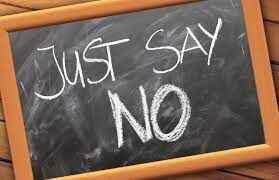Assertiveness
The Assertiveness Habit
Assertiveness is essential for habit change—and for self-respect.
Posted September 13, 2012

What do these situations have in common?
- You’d like to add exercise to your morning routine, but you aren’t sure if your spouse would be happy about it. So you do nothing.
- Your mother coaxes you to have a piece of her delicious sweet potato pie. You aren’t hungry and are watching your weight, but you don’t want to hurt her feelings, so you force a smile, say yes, and choke it down.
- Your friend makes a snide remark, and you feel upset but say nothing.
In each of these situations, you needed to speak up but didn’t. When you don’t stand up for yourself, your actions are non-assertive—allowing other people to violate or ignore your rights and feelings. If you ever feel like a doormat, you’ve probably just been non-assertive. The goal of non-assertive behavior is usually to avoid conflict; however, the habit of non-assertiveness can erode your self-respect and make you feel spineless, resentful, helpless, or out of control. Non-assertiveness, moreover, can undermine your habit change goal, as in the situations above.
Non-assertiveness, endured too long, can easily morph into aggressiveness. From a stance of non-assertion, you suddenly explode into an attitude of: "I'm mad as hell, and I'm not going to take it any more!" When you act aggressively, you deliberately violate or ignore the rights of others or carelessly disregard their feelings. If you have a conscience, you’ll know when you’ve been aggressive because you’ll feel guilty afterward.
So, habit-changers, what will you do if a friend tries to convince you to go to the all-you-can-eat buffet, offers a drag on his cigarette, or invites you to a movie on a night when you need to work? Will you become a non-assertive doormat and give in? Will you become an aggressive bully and “tell him off?”
There is a third way: Be assertive. Assertiveness is defined as “direct, honest, and appropriate ways of standing up for your rights while respecting the rights of others.” It’s the golden mean between non-assertiveness and aggressiveness.
True assertiveness requires a mixture of compassion and chutzpah. You need to be able to empathize with the other person's situation and respect her rights. At the same time, you need to keep your own goals in mind and have the moxie to insist that the other person understand your situation and rights. Developing this kind of two-track mind is a complex skill.
That's why cultivating the assertiveness habit can be a lifelong process. It can be helpful to get therapy or read an entire book on the topic (or two or three...see below). An Assertiveness Training (AT) class can teach you how to think up assertive self-talk, use appropriate body language, understand your rights in interpersonal situations, give you the opportunity to practice, and much more. So, speaking of chutzpah, can you become more assertive by the end of this blog?
Yes, you can! All you need is a few all-purpose assertive phrases. Memorize these, practice them, and say them gently but firmly when you get stuck or tongue-tied:
- “I’m just not comfortable with that.”
- “I’ll think about it.”
- “No thank you.”
- “I could use some help.”
- “I don’t appreciate it when you _____. Please stop now.”
- “I don’t like___. I’d prefer ____.”
Expect to fail from time to time. Keep trying. Remembering what a difficult skill assertiveness is can help you persist.
Should you always be assertive? Not at all. Sometimes life calls for protective aggressiveness or wise non-assertiveness. But if you want relationships that are more open, honest, and kind, aim for the assertiveness zone as much as possible.
© Meg Selig
Portions of this blog were adapted from the chapter, “Speak Up,” from my book Changepower! 37 Secrets to Habit Change Success (Routledge, 2009). For more info on habit change, willpower, and health, like me on Facebook or follow me on Twitter.
A few favorite assertiveness books:
Jakubowski, P. & Lange, A. The Assertive Option. (Research Press, 1978). A golden oldie.
Alberti, R. & Emmons, M. Your Perfect Right. (Impact Publishers, 2008).
Powell, E. Talking Back to Sexual Pressure (CompCare, 1991). **New ebook format here.




